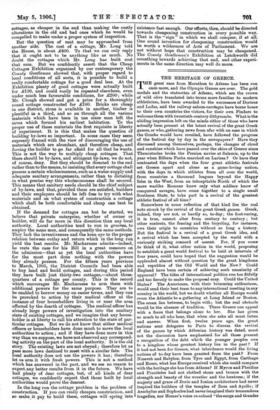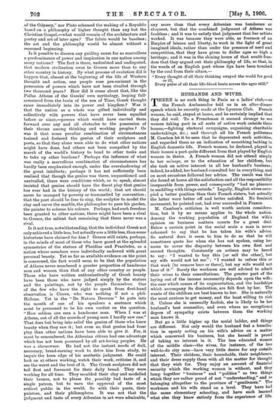THE HERITAGE OF GREECE. T HE great race from Marathon to
Athens has been run once more, and the Olympic Games are over. The gold medals and the statuettes of Athena, which are the crown of wild olive translated into terms more familiar to modern athleticism, have been awarded to the successors of Dorieus and Ladas, and the railway saloon-carriages have borne home to their own countries the victors, for their own Pindars to welcome them with twentieth-century dithyrambs. What is the abiding impression left on the minds either of those who have actually been present at the latest revival of the great Greek games, or who, gathering news from afar with an ease in which the Greeks would have revelled, have followed the progress of the festival day by day in the newspapers ? Have they discussed among themselves, perhaps, the changes of cloud and sunshine which have passed over the skies of Greece since Themistocles broke the Persian navies at Salamis, up to the year when Edhem Pasha marched on Larissa ? Or have they contrasted the days when the four great athletic festivals set Greece apart and alone as a game-loving nation, with the days in which athletes from all over the world, from countries a thousand leagues beyond the Happy Isles in the West, from an inhospitable North of which the more warlike Romans knew only what soldiers know of conquered savages, have come together to a single small Southern State, to take part in a revival of the greatest athletic festival of all time ?
Somewhere in some reflection of that kind lies the real note struck by the revival of the great Greek games. Greek, indeed, they are not, or hardly so, to-day ; the foot-racing, it is true, cannot alter from century to century ; but other contests, the fencing and the bicycling, for instance, owe their origin to countries without so long a history. But the festival is a revival of a great Greek idea, and a revival which has been accepted by the world with a curiously striking concord of assent. For, if you come .to think of it, what other nation in the world, proposing to establish a great world festival to be held at intervals of four years, could have hoped that the suggestion would be applauded almost without question by the great kingdoms and republics of the Old World and the New ? Could England have been certain of achieving such unanimity of approval ? The tides of international politics run too fitfully and too fiercely to make the proposal easy. Could the United States ? The Americans, with their brimming enthusiasm, would send their best team to any international meeting in any country in the world, but we doubt whether all Europe would cross the Atlantic to a gathering at Long Island or Boston. The ocean lies between, to begin with ; but the real obstacle would be the absence of tradition. There Greece can appeal with a force that belongs alone to her. She has given so much to all who hear, that when she asks all must listen and answer. When first, twelve years ago, the great nations sent delegates to Paris to discuss the revival of the games by which Athenian history was dated, must not the discussion have emphasised for all those present a recognition of the debt which the younger peoples owe to a kingdom whose greatest history lies in the past ? If it had not been for Greece, what inheritance would the living nations of to-day have been granted from the past ? From Nineveh and Babylon, from Tyre and Egypt, from Carthage and Rome, what has Europe received which she could compare with the heritage she has from Athens? If Myron and Pheidiaz and Praxiteles had not clothed stone and bronze with the strength and beauty of the wrestler and the huntress; if the majesty and grace of Doric and Ionian architecture had never inspired the builders of the temples of Zeus and Apollo ; if Aeschylus and Sophocles had never imagined their tremendous tragedies, nor Homer's voice re-echoed "the surge and thunder
of the Odyssey," nor Plato schemed the making of a Republic based on a philosophy of higher thought than any but the Christian Gospel,—what would remain of the architecture and poetry and art of later ages P The fabric would be baseless; the art and the philosophy would be almost without a • reasoned beginning.
Is it possible to discern any guiding cause for so marvellous a predominance of power and inspiration in one nation among many nations ? The fact is there, undoubted and undisputed, that modern civilisation owes to Greece more than to any other country in history. By what process of evolution did it happen that, almost at the beginning of the life of Western thought and action, one people rose pre-eminent in the possession of powers which have not been rivalled through two thousand years? How did it come about that, like the Pallas Athene of the Greeks' own mythology, leaping full- armoured from the brain of the son of Time, Greek thought came immediately into its power and kingdom? Was it that the nation as a whole was gifted individually and collectively with powers that have never been equalled before or since,—powers which would have carried them forward over any and all obstacles to the possession of their throne among thinking and working peoples ? Or was it that some peculiar' combination of circumstances trained and fostered the genius of their sculptors and poets, so that they alone were able to do what other nations might have done, had others not been compelled by the march of the world's history to bend to other tasks and to take up other burdens ? Perhaps the influence of what was really a marvellous combination of circumstances has hardly been emphasised enough, under the overshadowing of the great intellects ; perhaps it has not sufficiently been realised that though the genius was there, unquestioned and unrivalled, there were conditions which, so to speak, almost insisted that genius should have the finest play that genius has ever had in the history of the world ; that art should never be cramped by poverty or trammelled by convention ; that the poet should be free to sing, the sculptor to model the clay and carve the marble, the philosopher to pace his garden, the painter to scheme his colours. Perhaps, had such freedom been granted to other nations, there might have been a rival to Greece, the salient fact remaining that there never was a rival.
Is it not true, notwithstanding, that the individual Greek not only achieved a little less, but actually was a little leas, than some historians have claimed for him ? Greece still exists, perhaps, in the minds of most of those who have gazed at the splendid symmetries of the statues of Pheidis.s and Praxiteles, as a nation whose members were individually endowed with great personal beauty. Yet so far as available evidence on the point is concerned, the fact would seem to be that the population of Athens never numbered a greater proportion of handsome men and women than that of any other country or people. Those who have written enthusiastically of Greek beauty have been those who have judged simply by the statues and the paintings, not by the people themselves. One of the few who have the right to speak from first-hand observation is Cicero, who was nothing if not a phil- Hellene. Yet in the "De Natura Deorum " he puts into the mouth of one of his speakers a sentence which must be presumed to be his own verdict on the question. "How seldom one sees a handsome man. When I was at Athens, out of all the crowds of young men I hardly saw one." That does but bring into relief the genius of those who knew beauty when they saw it; but even so, that genius had freer play than other nations have been able to give it. For, it must be remembered, the Athenian citizen had one advantage which has not been possessed by all art-loving peoples. He was a slaveowuer. He had not the instant needs of dull, necessary, bread-earning work to drive him from study, to impair the keen edge of his aesthetic judgment. He could look on at others working, watch their work, criticise it, and see the worst and the best of it. The Greek sculptors did not toil first and foremost for their daily bread. They were working for all time. They moulded their clay and modelled their bronze, not to please the, possibly bad taste of a single patron, but to earn the approval of the most critical public in the world. So with their poets, their painters, and their philosophers. It was not that the judgment and taste of every Athenian in art were admirable,
any more than that every Athenian was handsome or eloquent, but that the combined judgment of Athens was faultless ; and it was to satisfy that judgment that her artists worked. It was because they were able, as freemen of an Empire of leisure and liberty, to work in the light of great imagined ideals, rather than under the pressure of need and competition, that they have given to duller ages so high a heritage; and it was in the shining hours of that sunlit free- doni that they argued out their philosophy of life,' so that, in the words of an English poet whose lips have been touched by the coal from their altars,—
" Every thought of all their thinking swayed the world for good or ill, Every pulse of all their life-blood beats across the ages still."









































 Previous page
Previous page